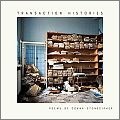She thought that if she stared hard enough at the past, she might catch the moment when it turned into history. Or at least when it turned into happiness: like sugar crystallizing into sweetness in the mouth, the past crystallizing into pastness in the mouth of time, which crunches it into the petit-fours of history, recent history, ancient.
*
It was with full cognizance of the worldwide melting of glaciers that we rode the téléphérique up to gaze down at the glacier at the top of an incognizant world. It looked like nothing more than a dirty ice-skating rink extending for miles, but still exuded the pathos of an expiring species, I said, when you leaned over and kissed me for, as only became clear later, what would be one of the last times.
*
In the shop window: a row of plaster copies of Mont Blanc, and underneath that a row of plaster copies of the Matterhorn. She sideswiped his grandfather’s Cadillac just once on the dozens of dizzying hairpin curves down into the town. The Alps in the distance looked exactly like the Alps; the slices of cherry cake on white porcelain plates in the mirrored café looked exactly like slices of cherry cake.
*
She asked him why there was a chapel in the airport. He asked her why it made them so happy to go to museums to look at objects that used to belong to the filthiest of the filthy rich. By the time they made it to the zoo to see the famous baby polar bear, it had morphed into a big smudged adult with a protuberant snout and teeth that could gnash their bones into powder in the time it takes a snowflake to melt.
*
They knew there must be a warming point at which sentiment melts into sentimentality, pathos into bathos. Which Alp was framed in the window when the sun exploded on his grandfather’s bed? Staring at the ice we saw a ring, which no carving with your pocketknife could deliver to my hand. Why, she wondered, aren’t whole industries invested in trying to stop the present from deliquescing into the past?
*
Meanwhile, it said in the novel, I had the voluptuous sensation of being slowly erased by the billowing steam of a nineteenth-century train . . . She asked him why it was that the Italians call Germany Tedesco, and the French call it Allemagne. Brushing her ear with his lips, he asked her whether she thought that each of the gilded Louis XIV desk’s dozens of locked drawers would open to only one gold key.
*
In the mirrors they watched the cherry cake slices recede into infinity. He kept talking about how the Swiss chalets back down in the village had looked exactly like Swiss chalets. She wanted to feel it, the instant the photoshopped photograph of a glacier turned into “art history,” the whitewashed apartment block turned into “the vernacular,” its recessed balconies noted in volumes on architecture.
*
For there must be an exact notch in time when it occurs: a building falls into a ruin, a ride on the téléphérique ices over into a memory, a distant memory freezes into a fetish, a loved one disappears over the horizon for good, like a container ship loaded with adult polar bears distributed to indifferent southern zoos. A video of the abandoned polar bear’s death spiral has almost a million views on YouTube.
*
The only thing they could afford to order at the café was snow-capped hot chocolate. Years later, tucked into a copy of The Castle, she found an unsent postcard of the baby polar bear. Hadn’t she only wanted him to lace up her ice skates and take her back up to the glacier? Hadn’t she only wanted to skate and skate and skate until she could trace figure eights straight into the brown mountainous ground?




